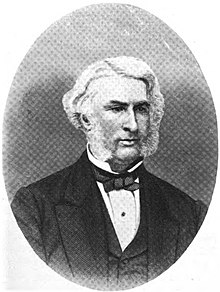Joseph Casey (congressman)
Joseph Casey | |
|---|---|
 | |
| Chief Justice of the Court of Claims | |
| In office March 13, 1863 – December 1, 1870 | |
| Appointed by | Abraham Lincoln |
| Preceded by | Seat established by 12 Stat. 765 |
| Succeeded by | Charles D. Drake |
| Judge of the Court of Claims | |
| In office May 23, 1861 – March 13, 1863 | |
| Appointed by | Abraham Lincoln |
| Preceded by | George Parker Scarburgh |
| Succeeded by | Seat abolished |
| Member of the U.S. House of Representatives from Pennsylvania's 13th district | |
| In office March 4, 1849 – March 3, 1851 | |
| Preceded by | James Pollock |
| Succeeded by | James Gamble |
| Personal details | |
| Born | Joseph Casey December 17, 1814 Ringgold, Maryland |
| Died | February 10, 1879 (aged 64) Washington, D.C. |
| Resting place | Oak Hill Cemetery Washington, D.C. |
| Political party | Whig |
| Education | read law |
Joseph Casey (December 17, 1814 – February 10, 1879) was a United States Representative from Pennsylvania and a judge and chief justice of the Court of Claims.
Education and career
[edit]Born on December 17, 1814, at Ringgold Manor in the unincorporated community of Ringgold, Washington County, Maryland,[1] Casey read law with Charles B. Penrose of Carlisle, Pennsylvania in 1838.[1] He was admitted to the bar and entered private practice in Bloomfield, Pennsylvania from 1838 to 1845.[1] He continued private practice in New Berlin, Pennsylvania from 1845 to 1849.[1]
Congressional service
[edit]Casey was elected as a Whig from Pennsylvania's 13th congressional district to the United States House of Representatives of the 31st United States Congress, serving from March 4, 1849, to March 3, 1851.[2] He declined to be a candidate for renomination in 1850.[2]
Later career
[edit]Following his departure from Congress, Casey resumed private practice in New Berlin from 1851 to 1855, and in Harrisburg, Pennsylvania from 1855 to 1861.[1] He was a Commissioner for the Commonwealth of Pennsylvania in 1855.[1] He was the reporter of decisions for the Supreme Court of Pennsylvania from 1856 to 1861.[1]
Federal judicial service
[edit]Casey received a recess appointment from President Abraham Lincoln on May 23, 1861, to a Judge seat on the Court of Claims (later the United States Court of Claims) vacated by Judge George Parker Scarburgh.[1] He was nominated to the same position by President Lincoln on July 9, 1861.[1] He was confirmed by the United States Senate on July 22, 1861, and received his commission the same day.[1] His service terminated on March 13, 1863, due to his elevation to be Chief Justice of the same court.[1]
Casey was nominated by President Lincoln on March 12, 1863, to the Court of Claims, to the new Chief Justice seat authorized by 12 Stat. 765.[1] He was confirmed by the Senate on March 13, 1863, and received his commission the same day.[1] His service terminated on December 1, 1870, due to his resignation.[1]
Later career and death
[edit]Following his resignation from the federal bench, Casey resumed private practice in Washington, D.C. from 1871 to 1879.[1] He was a professor at National University (now George Washington University) from 1871 to 1879.[1] He died on February 10, 1879, in Washington, D.C.[1] He was interred in Oak Hill Cemetery in Washington, D.C.[2]
References
[edit]Sources
[edit]- United States Congress. "Joseph Casey (id: C000224)". Biographical Directory of the United States Congress.
- "Casey, Joseph - Federal Judicial Center". www.fjc.gov.
- The Political Graveyard
- Judges of the United States Court of Claims
- Pennsylvania state court judges
- Pennsylvania lawyers
- 1814 births
- 1879 deaths
- Burials at Oak Hill Cemetery (Washington, D.C.)
- United States Article I federal judges appointed by Abraham Lincoln
- 19th-century American judges
- Whig Party members of the United States House of Representatives from Pennsylvania
- 19th-century people from Pennsylvania
- 19th-century American legislators
